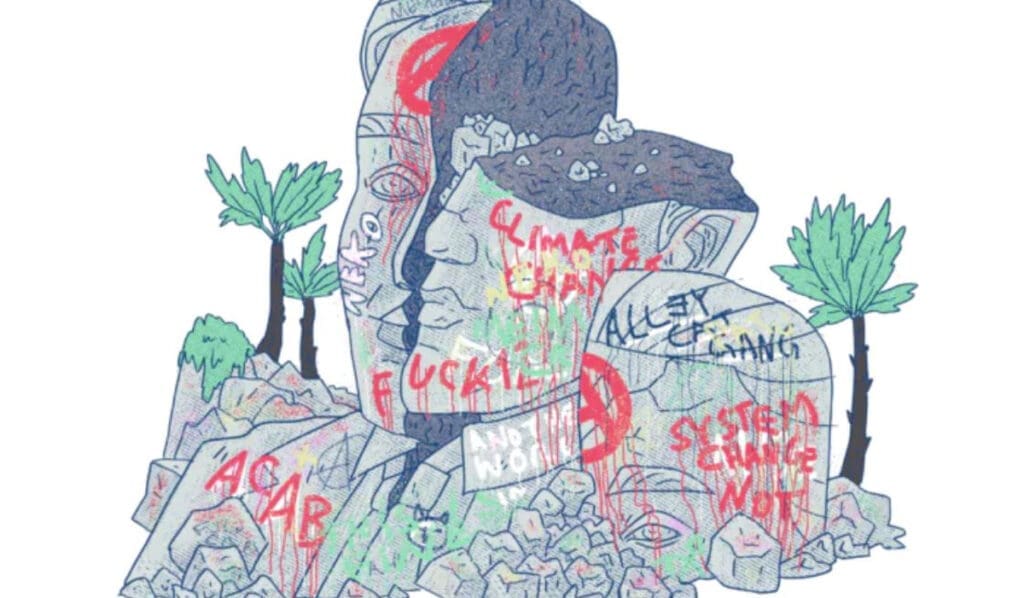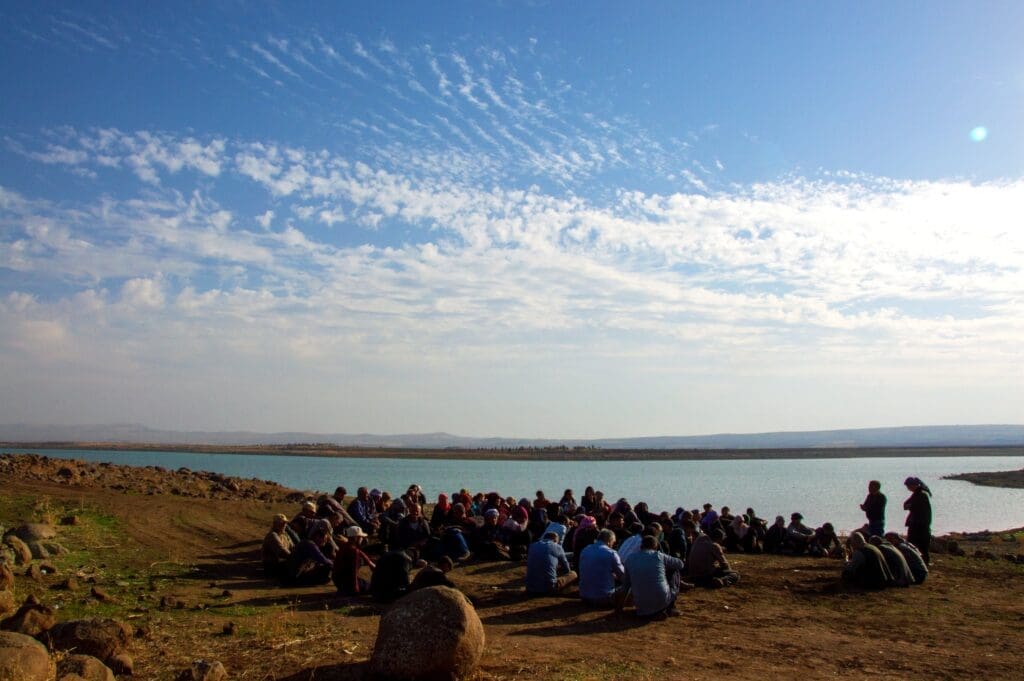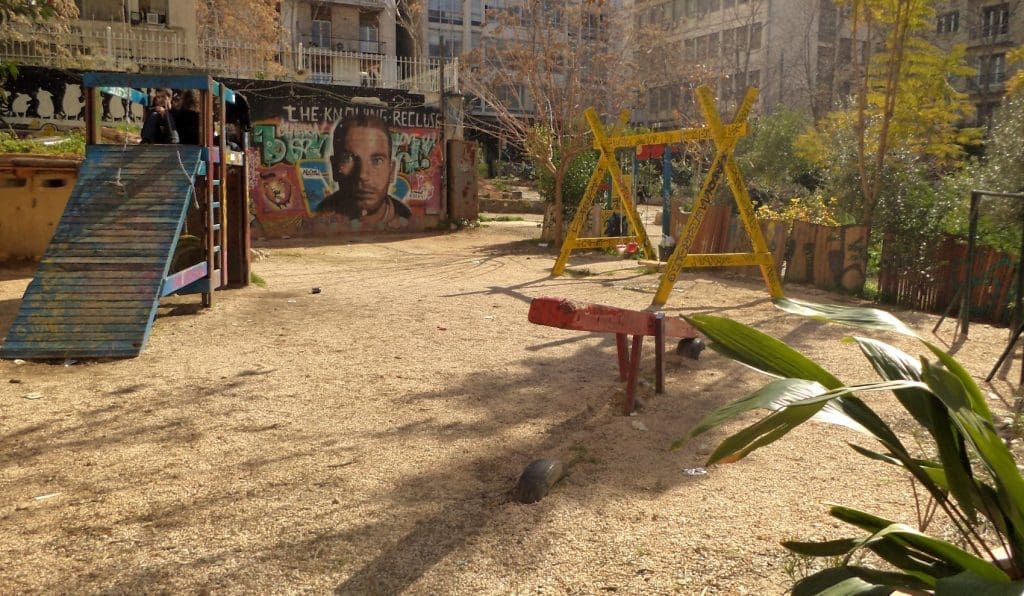The Burning House
Does signaling apocalypse invite resignation? Historically, it has actually been part of the language of resistance.
by Paul Dziedzic for analyse & kritik no. 675
19 October 2021 (Originalversion auf Deutsch)
Kimpa Vita grew up in the Kingdom of Kongo between the seventeenth and eighteenth centuries.i The kingdom she was born in was collapsing as a consequence of dynastic wars and political intrigue—and then the Portuguese came. They arrived on the coast of the kingdom in ships, made alliances, and started conflicts, while eagerly proclaiming their missionary goodwill. But the only thing they really wanted were chattel humans. Many of the conflicts were about access to enslaved people. Kimpa Vita grew up amid an age of crisis. A Christian herself, she put her political analysis in the language of the bible.
Biblical figures, she said, saints and angels, appeared to her in visions. They looked like her: Black. Kimpa Vita went out and preached. She warned against false prophets, declared that the events of the bible had taken place in the Congo, and that the final judgment would also be held there. Within a very short time she had a following, predominantly among peasants, but a few noblepeople also joined. The movement aimed to unify the country and elect a new king, and it became a real political force that was a thorn in the side of those who held power within the fractured kingdom, like the Portuguese. At the emphatic urging of the Portuguese clergy, Kimpa Vita was burned at the stake at the age of twenty-two.
Over five hundred years of genocides, expulsions, famines, and plagues: slavery and colonialism had catastrophic consequences for countless societies—they spelled the end of the world. Movements arose to stave off this nightfall, and adopted religious language to do so. This language was the synthesis of the language of power and its antithesis. This was necessary insofar as the differences among many jostling communities and nations had to be bridged. It was not rare for political movements to appropriate the ideologies of their oppressors, as Kimpa Vita did. There are many lessons for us to draw from this today, since such an apocalyptic mood has arisen in the face of climate change. But the question is: does an apocalyptic imaginary simply cause resignation?
Jehovah’s Witnesses in class struggle
In his book A History of Pan-African Revolt, Black Marxist C.L.R. James looks at the many uprisings against colonialism in Africa and the Americas. It is especially striking that James deconstructs the Watch Tower movement in southern Africa. The Watch Tower movement was formally a religious organization that had originated from US Jehovah’s Witnesses—though indeed, the Witnesses in Africa very quickly developed their own dynamic. Instead of simply awaiting the end of the world, as in Europe in America, adherents in Africa rebelled against the colonial order.
The movement recruited mainly among industrial workers in urban centers along the Copperbelt, which stretched from today’s Zimbabwe into the Congo. The peak of their activities was the Copperbelt Strike of 1935, the first ever mass industrial strike in Rhodesia and Congo. The remarkable thing about this strike was that it did not only mobilize the members of the Watch Tower movement; the Copperbelt Strike was directed both against working conditions and against the colonial order more generally. In the aftermath of the strike, unions and parties emerged in Rhodesia that still exist today. The British colonial administration was compelled by this struggle to establish new social security policies for workers.
James’s work was received by many with surprise; he had taken on the study of religious movements that faced severe prejudice, especially in the West. However, his contemporary, anti-colonial intellectual Walter Rodney, wrote that James, in contrast to European observers, did not view the movements simply as religious or superstitious; mainly, he was making a distinction between form and content. The religious language of the protesters could not conceal that the protests arose from material conditions like forced labor, land theft, and colonial taxes.
Integration into the apocalypse is not an option
In many settler-colonial states like Canada and Australia, it has become a matter of courtesy for officials to make a land acknowledgment at the start of an event.ii This does indicate some success in the ongoing struggle over historical memory, but the ceremony slips quickly into being an empty gesture. The land has never been given back, and the communities on that land who are symbolically recognized in these statements continue to be socially marginalized. What is a land acknowledgment, then, other than a mindfulness practice? As soon as new exploitable resources are discovered or a pipeline needs to be built through Indigenous lands, the state resumes its age-old brutality.
In Eurocentric discourses, many worldwide colonial uprisings are viewed all too often as tragic and impotent attempts to overcome the mighty colonial order. Indirectly, participants in anti-colonial resistance are attributed with false consciousness, or simply folly, to have tried to take on a great power from the peripheries of “civilization.” But is the struggle even over? What is the end of the world, after all, other than the destruction of the basis of existence, exhaustion, and hopelessness?
Isn’t this world the sum total of past apocalypses?
The only response to those who still oppose perpetual colonial exclusion has been to shout, “It’s your own fault!” and offer “integration” into the economic system. Today, in light of the coming catastrophes, the question posed by African-American author James Baldwin once again presents itself: “Do I really want to be integrated into a burning house?” Also, the structural integrity of the house is questionable. Isn’t this world indeed the sum of past apocalypses? The machinery powered by fossil fuels, land theft, and exploitation runs merrily on.
Still today, this is what continues to drive uprisings, blockades, and protests. It is not rare for Indigenous communities, the descendants of those who have already experienced the apocalypse, to be on the very front lines: the many smallholder farmers living in subsistence economies; the five percent of people living in Indigenous communities and who are caretakers of over eighty percent of the endangered biodiversity of the world; or the Water Protectors who, five years ago at the Standing Rock protest in the US, fought to ensure that ever-more-precious water would not be polluted by tar sands oil.
That broad movements like this are still possible today has also been shown by Black Lives Matter. It stands in a long tradition of Black resistance: those who gather under its banner come from many different thought traditions, but they are speaking one language. Black Lives Matter doesn’t have some secret recipe, but is an outgrowth of the ways Black people in the Americas have been coming together for centuries.
There is an exchange of ideas happening in these movements—for example, around concepts of transformative justice, or the demand for rights for Mother Earth like in Ecuador, a proposal that should assist in overcoming the false divide between people and nature. During the forest fires in the US, Australia, and Canada, many groups pointed out that Indigenous communities have centuries’ worth of knowledge and experience when it comes to forest management. And still it takes a lot of “persuasive labor” for them to achieve any kind of legislative or organizational voice in matters of land use or even firefighting.
There is no lack of knowledge or ideas. And right now, as we can plainly see time is running out, and as the industrial nations of the world are stalling out on climate change mitigation efforts, it should be clear that no solutions will be coming out of those countries. These countries do, however, still dictate the rules to a great part of the world, and insist that we’ll all just have to get used to it, as if it hasn’t been like this for the last five hundred years already.
The question, then, of whether signs of a coming apocalypse will lead to resignation, is perhaps a question of for whom. For those who have already been fighting for centuries, this isn’t a question at all.
Paul Dziedzic is an editor at ak.
Translated with author’s permission by Antidote.
Featured image: illustration by Maik Banks, via analyse & kritik
Notes:
i Not to be confused with the nation-states that currently carry this name. The kingdom stretched all the way along the west African coast from today’s Republic of Congo to Angola.
ii Example of a land acknowledgment in Australia: “I begin today by acknowledging the Traditional Custodians of the land on which we gather today, and pay my respects to their Elders past and present. I extend that respect to Aboriginal and Torres Strait Islander peoples here today.”





